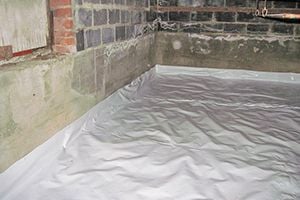
Denver Crawl Space Insulation
Crawl Space Insulation Contractors in Denver & Fort Collins, Colorado
The crawl space insulation contractors at REenergizeCO can install high-quality insulation and a vapor barrier to ensure that your crawl space is properly sealed. Crawlspace insulation is essential for increasing your home’s comfort, saving energy, and preserving your home’s foundation.
At REenergizeCO, we have insulated countless crawl spaces. Our goal is to ensure that you and your family remain comfortable throughout the year, and insulating your crawl space is a great way to do just that! We pride ourselves on giving you the highest quality of service.
Experts at REenergizeCO insulate Colorado crawl spaces in Denver, Fort Collins, and throughout the Front Range. Contact REenergizeCO to learn how a crawl space insulation contractor can make your home more comfortable and efficient.
Is Crawl Space Insulation Worth It?
Crawl spaces are dark and damp. It’s easy for homeowners to forget about them, resulting in a lack of maintenance and upkeep. This can lead to a number of unpleasant issues:
- Moisture buildup
- Pest infestations
- Mold and mildew growth
- Inadequate insulation and ventilation
- Structural damage to your home
Crawlspace insulation is an excellent preventative measure if you want to avoid these problems. An investment in insulation and a crawl space vapor barrier now can save you a lot of money later on costly projects like foundation repair, pest control, and more.
Questions?
"*" indicates required fields
How Much Does It Cost to Insulate a Crawl Space?
Transparent upfront pricing is one of the major reasons customers choose REenergizeCO. We insulate Fort Collins and Denver crawl spaces for $4–$7 per square foot. Complete crawlspace insulation and encapsulation means you can say goodbye to cold floors and start reducing your energy bills right away!
What R-Value Is Needed for the Crawl Space?
R-value measures an insulation material’s resistance to heat. The recommended R-value for Colorado crawl spaces is R-19.
How Thick Should Crawl Space Insulation Be?
Ultimately, the desired thickness of crawlspace insulation depends on the type of insulation material and its R-value. At REenergizeCO, we recommend one of the following options for insulating the crawl space:
- Closed cell spray foam insulation: Installing spray foam insulation on the exterior walls of the crawl space is ideal for obtaining the necessary thermal resistance.
- Rigid foam board insulation: Useful for walls, floors, foundations, and ceilings, rigid foam board insulation is another great option for crawl spaces.
- Vinyl-wrapped fiberglass insulation: Fiberglass batts are extremely effective, but they need added protection for insulating a crawl space. Vinyl wrapping helps keep the fiberglass dry and free of debris, both of which are essential for maximizing the effectiveness of crawlspace insulation.
Qualified crawl space insulation contractors can determine what type of insulation is best and how thick it should be. We fully insulate the space and install a vapor barrier.
Client Reviews & Testimonials
Why Do I Need a Crawl Space Vapor Barrier in Denver?
Denver, Fort Collins, and the Front Range as a whole have a dry climate. However, moisture is still a concern—particularly when it comes to crawl spaces.
If you have an older home, you likely have a vented crawl space. Hot and humid air can easily enter vented crawl spaces. When this air comes into contact with the floorboards and other surfaces that are cooler, the humid air will condense and turn wet.
The solution is to insulate AND encapsulate the crawl space. Encapsulation involves installing a combination of insulation and moisture barriers to prevent moisture intrusion, improve indoor air quality, and enhance energy efficiency.
Read More: Do I Need to Insulate My Crawl Space?
When installing a crawl space vapor barrier in Denver, our team covers the entire ground surface with durable plastic sheeting. We ensure that any seams overlap and secure the edges to create a continuous barrier. Often, the vapor barrier is extended up the walls of the crawl space to provide additional protection.
This video shows how Casey installs crawl space insulation in a Denver home
What Are the Benefits of Crawl Space Insulation?
Insulating your crawl space has a number of benefits. These include:
1. Enhanced Home Comfort
If you are experiencing an issue with the rooms above your crawl space feeling much warmer or cooler than the other areas of your home, the culprit is likely your crawl space. Insulating your crawl space will help with temperature regulation, reduce drafts, and eliminate cold spots in the rooms above.
2. Energy Efficiency
Each time air leaks from ducts or when condensation builds in your crawl space, your HVAC system is forced to work extra hard to regulate the air throughout your home. This leads to a significant loss of energy and, over time, can decrease the lifespan of the equipment.
Aside from the attic, your crawl space represents the second largest opportunity to reduce your home energy usage. It is vital to have it adequately insulated by an expert crawl space insulation contractor at REenergizeCO.
3. Savings on Utility Bills
Insulating your crawl space helps to ensure that the efficiency of your HVAC system is sustainable. As a result, your energy bills will decrease significantly because your system does not have to work as hard.
4. Moisture Control
Proper insulation reduces condensation and prevents moisture from entering the crawl space. This can help to counter mold growth, wood rot, and other moisture-related problems that can damage the structure of the home and affect indoor air quality.
5. Preventing Frozen Pipes
In Colorado, frozen pipes are a major concern in the wintertime. Insulating the crawl space provides protection for the pipes underneath your house, reducing the likelihood that they will freeze or burst.
6. Improved Air Quality
By reducing moisture and hindering the growth of mold and mildew, crawl space insulation can help to improve the quality of air inside your home. Reducing allergens and pollutants is beneficial for all occupants, particularly those with allergies or respiratory issues.
7. Deterring Pests
Insulation and vapor barriers can keep rodents, insects, and other pests out of the crawl space. This minimizes the risk of infestations and can help you save money on expensive extermination jobs.
8. Strengthening Your Home’s Structural Integrity
Crawlspace insulation reduces the risk of moisture-related damage to wooden components such as floor joists and subflooring. This can help to extend the lifespan of the home and reduce the need for costly repairs in the future.
9. Increased Property Value
Homebuyers often prioritize energy efficiency when looking for a house. This makes a well-insulated crawl space a very attractive selling point.
10. A Better Basement
Denver crawl spaces might not get a lot of use, but basements sure do. The benefits of crawlspace insulation (such as moisture control, temperature regulation, energy efficiency, and indoor air quality) can have a positive effect on the basement environment. Proper insulation of the crawl space can also augment and prolong the lifespan of basement insulation.
Our Process: What to Expect from REenergizeCO

Having insulated hundreds of homes in the Colorado Front Range, our crawl space insulation contractors know how to maximize your home’s energy efficiency and comfort from the ground up. We start with a home energy audit to identify where you’re losing money and how crawl space insulation can help.
Next, we turn our attention to the following:
- Installing the vapor barrier: We install a continuous layer of reinforced polyethylene plastic over the bare ground, ensuring it covers all areas and securely taping it around support posts and foundation footings. This barrier effectively blocks moisture, water, and gases from seeping into your home. If you’re experiencing musty or earthy odors inside your home, installing a crawl space vapor barrier can effectively eliminate this issue.
- Air sealing: Using spray foam insulation, we seal off any gaps, cracks, or openings in the crawl space walls, foundation, and floor to prevent air infiltration from the outside.
- Creating the thermal barrier: Rigid foam board or vinyl-wrapped insulation batts are installed along the walls of the crawl space. Our crews use a Ramset tool to securely fasten the insulation to the concrete substrate.
- Sealing the rim joists: The framing for the floor above is right on top of the foundation walls of your crawl space. Rim joists support the floor trusses. These joists are usually 1 square foot each and 12–16 inches apart. We foam the rim joists to stop cool air from infiltrating into the crawlspace above the foundation walls.
- Finishing touches: The thermal barrier (insulation) shouldn’t be in direct contact with the crawl space ceiling or the trusses of the floor above. Our crawl space insulation contractors carefully inspect the work and make adjustments to ensure proper ventilation.
Choosing the Right Crawl Space Insulation Contractor
There’s plenty of information online about how to insulate a crawl space yourself. When it comes to saving you money, time, and aggravation, though, there’s simply no substitute for professional installation.
Qualities to look for in a crawl space insulation contractor include:
- Experience & Expertise: You need a contractor with extensive experience in crawl space insulation and moisture control. Ask about their track record and the number of projects like yours they have completed successfully. Experienced contractors are more likely to provide quality workmanship and effective solutions for your specific needs.
- Licensing & Certification: Verify that the contractor is properly licensed and certified to perform insulation work in your area. Licensing requirements may vary depending on your location, so it’s essential to ensure that the contractor meets all regulatory requirements.
- Reputation & Reviews: Research the contractor’s reputation by reading online reviews. A reputable contractor should also be able to provide you with references from satisfied customers willing to speak about their experience.
- Transparent Pricing: Most homeowners shop around before hiring a crawl space insulation contractor. Every contractor you speak with should be willing to provide a detailed explanation of the quoted price.
- Quality Materials & Products: Inquire about the types of insulation materials and products the contractor uses. Choose a contractor who offers high-quality, reputable insulation products that meet industry standards for performance and durability.
- Guarantees & Warranties: Inquire about any guarantees or warranties offered by the contractor for their workmanship, as well as the insulation materials used. A reputable contractor should stand behind their work and provide warranties that protect you in case of defects or issues with the insulation.
- Customized Solutions: No two Denver crawl spaces are exactly alike. The insulation contractor you select should tailor the project to the particular needs of your crawl space and your unique goals.
- Professionalism & Communication: From the initial phone call to the home visit, pay close attention to the contractor’s communication skills and responsiveness. The contractor you choose should be courteous, punctual, and willing to address any questions or concerns you may have throughout the project.
REenergizeCO is recognized as one of the top rebate-producing insulation contractors by Xcel Energy. We have also received the highest marks on HomeAdvisor. Customers in Colorado trust us with their crawl spaces!
Commonly Asked Questions About Crawl Space Insulation
Why is my crawl space wet?
Water and moisture can infiltrate your crawl space through numerous points. Typically, moisture gets inside by way of fissures in the foundation and walls of your home’s crawl space. Other common issues that can dampen your crawl space include improper ventilation, poorly constructed drainage systems, and poorly sealed floors.
Why is the floor above my crawl space cold?
You may have a cold floor above your crawl space because cold air is flowing in and warm air is getting out. Moisture accumulation can also cause the floor above a crawl space to become cold.
There are several potential culprits for cold floors above a crawl space, including inadequate insulation, openings in the crawl space walls or foundation, and unsealed ductwork. An insulation contractor can assess the situation and recommend solutions, including crawlspace insulation.
Can vents keep my crawl space dry?
The idea that vents keep crawl spaces dry is a common misconception. In reality, vents alone do not provide sufficient ventilation to maintain low moisture levels in the crawl space.
Vents can be blocked by outside plants, restricting airflow. Over time, gaps can develop in the sealing around them. This damage will eventually allow water to collect and drip into your crawl space, causing severe damage to wood components, the foundation, and any existing insulation.
Is gravel or a vapor barrier enough to protect my crawl space from moisture?
Not exactly. A layer of gravel or sand is not enough to block moisture from a crawl space with a dirt floor. Furthermore, a vapor barrier by itself will not protect your crawl space from moisture because it doesn’t fully seal up gaps and openings. To fully protect your crawl space, a combination of proper insulation and a vapor barrier is necessary.
Can the air in my crawl space get into my home?
Yes, the air from the crawl space can quite easily infiltrate your home. In fact, 40–50% of the air inside your house comes in by way of the crawl space. This air may contain harmful bacteria, mold spores, and other pollutants, all of which can lead to health issues.










